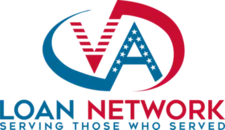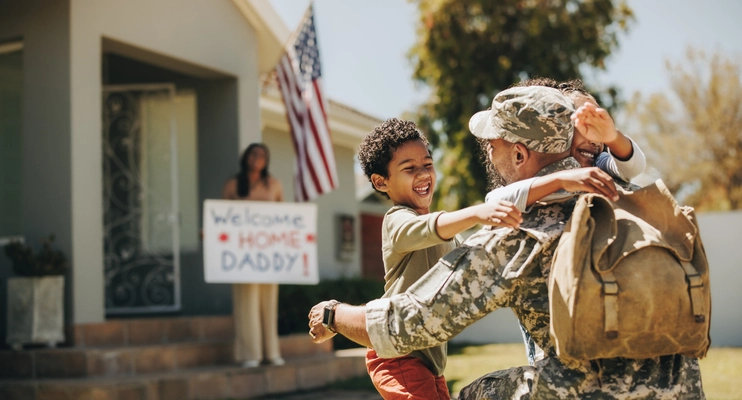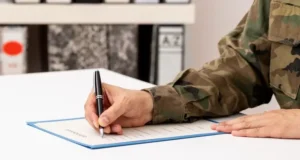Many Veterans dream of owning a home after their years of service. If you’re new to the homebuying process, you may have questions about how to handle monthly housing expenses—especially if you’re still receiving Basic Allowance for Housing (BAH).
BAH is a tax-free allowance designed to help offset housing costs, and if used wisely, it can fully or partially cover your mortgage payments. In this guide, you’ll learn exactly how BAH works, who qualifies, how it ties into VA loans, and what to watch for when buying a home as a Veteran.
This article will walk you through every step of using BAH effectively, from setting a budget to finding properties that fit your needs. Let’s dive in!
What Is BAH and How Does It Work?
Basic Allowance for Housing (BAH) is a monthly, tax-free benefit offered by the Department of Defense (DoD) to help eligible service members cover housing costs. While BAH is typically associated with active-duty service members, some Veterans in the National Guard or Reserve components on qualifying active orders (usually over 30 days) may still receive it. This means that if you’re a Veteran with continued Military commitments, you can factor BAH into your monthly finances.
BAH rates are determined by three major factors:
- Duty Station Location: ZIP codes with higher housing costs come with higher BAH rates.
- Pay Grade: Higher pay grades tend to receive larger allowances.
- Dependency Status: Veterans with dependents generally get a higher rate than those without.
For instance, if you’re an E-7 with dependents stationed in or near a high-cost area, you’ll likely receive a higher monthly BAH than an E-4 without dependents in a more affordable region. The DoD adjusts BAH rates every year based on local rental data, ensuring that you receive an allowance consistent with prevailing market conditions.
From a mortgage standpoint, BAH functions similarly to any other stream of regular income. If your BAH meets or exceeds your monthly mortgage payment (including principal, interest, taxes, and insurance), you might cover most or all of your housing expenses without dipping into your other earnings. If you’re still on active orders or frequently deployed, BAH can ease financial burdens for you and your family—especially as you transition into civilian life where consistent income is a significant concern.
In this Article
Can BAH Fully Cover Your Mortgage?
One of the biggest questions Veterans have is whether BAH can singlehandedly cover a mortgage. The answer hinges on your duty station location, pay grade, home price, and the type of loan you choose.
Consider these variables:
- BAH Rates vs. Home Prices: In expensive areas like Washington, D.C. or Honolulu, your BAH may not stretch as far as it would in more budget-friendly locations.
- Mortgage Amount: If you’re purchasing a modest property with a lower mortgage payment, BAH is more likely to handle most or all of your monthly costs.
- Loan Type: VA loans—often the best choice for eligible Veterans—usually come with lower interest rates and no private mortgage insurance, making your monthly payment more manageable.
For a quick snapshot, suppose you’re an E-6 with dependents stationed near Norfolk, VA, where your BAH rate in 2025 might be around $2,100 per month. If you buy a home for $250,000 with a 30-year VA loan at 6% interest, your monthly principal and interest payment could be around $1,500. With property taxes and insurance added, your total might come close to $1,800—still under your $2,100 BAH. In this scenario, BAH would likely cover most or all of your monthly housing expense.
Sample BAH Rates vs. Mortgage Payments
| Location | Pay Grade | BAH Rate (With Dependents) | Est. Mortgage Payment ($250K, 30-Yr VA Loan) |
|---|---|---|---|
| Norfolk, VA | E-6 | $2,100 | $1,800 (incl. taxes/insurance) |
| San Diego, CA | E-7 | $3,300 | $2,200 (incl. taxes/insurance) |
| Fort Bliss, TX | E-4 | $1,400 | $1,600 (incl. taxes/insurance) |
Note: Mortgage payments include estimated taxes and insurance. Your actual numbers will vary based on interest rates, loan terms, and personal credit.
Eligibility for BAH: Who Qualifies?
Traditionally, BAH is offered to active-duty Military members who live off base. However, certain Veterans serving in the National Guard or Reserve on federal active-duty orders (usually 30 days or more) may continue receiving BAH. If you’re transitioning from active duty to civilian life, keep in mind that your eligibility for BAH may end once your active orders conclude.
Here are the main eligibility points:
- Active-Duty Service Members: Typically receive BAH if they are not living in Military housing.
- Guard or Reserve Members on Active Orders (30+ Days): May qualify for BAH during the period of active duty.
- Dependency Status: Having dependents usually results in a higher BAH rate.
- Married Dual-Military Couples: Only one spouse can receive the “with dependents” rate unless they are stationed in separate locations.
If you and your spouse are both Veterans, and one of you is still receiving active-duty orders with BAH, coordinate your finances carefully. Confirm the exact rate you’re entitled to by consulting your local finance office. Eligibility rules can shift depending on the nature of your service, so always verify your specific situation with an official source.
How to Use BAH to Cover Your Mortgage
Whether you’re on active orders or in a Guard/Reserve role, the key to making BAH work for you is to plan strategically. Below is a step-by-step approach to ensure you’re setting yourself up for success:
- Check Your BAH Rate: Visit the DoD’s official BAH Calculator (at Defense Travel Management Office) to verify your latest rate by entering your ZIP code, pay grade, and dependency status.
- Set a Realistic Budget: Aim for a home price where the mortgage, taxes, and insurance stay within or close to your BAH amount. While VA loans often allow a higher debt-to-income ratio, staying around 43% or lower helps manage your monthly bills more comfortably.
- Consider a VA Loan: VA loans are a powerful benefit for Veterans. They generally offer lower interest rates, zero down payment, and no private mortgage insurance. This can help your BAH go further each month.
- Estimate Additional Expenses: Don’t forget property taxes, homeowners insurance, HOA fees, and potential maintenance costs. Even if your BAH covers the principal and interest, these extra expenses can add up.
- Select the Right Real Estate Agent: An agent who understands Veterans and Military families can guide you to properties that align with your budget and lifestyle. Their experience with VA loan transactions is an added bonus.
- Build Equity Over Time: If your monthly payments are comfortably covered by BAH, consider making additional principal payments. This speeds up your equity growth and can save you thousands in interest over the life of your loan.
By following these steps, you’ll have a comprehensive strategy for using BAH effectively. If you need more details on the process of securing a VA loan, check out our VA Loan Guide for step-by-step instructions, eligibility details, and helpful tips.
Stretching Your BAH: Tips for High-Cost Areas
High-cost real estate markets can intimidate even the most budget-savvy Veterans. If your BAH isn’t enough to cover a home in places like San Diego or the Washington, D.C. metro area, you still have options to make homeownership a reality.
Here are a few strategies:
- Multi-Unit Properties: VA loans allow you to purchase multi-unit properties (up to four units). Live in one unit and rent out the others to offset your mortgage. This can be an effective wealth-building strategy if you’re prepared for the responsibilities of being a landlord.
- Condos and Townhomes: These housing types often cost less than single-family homes, though pay attention to HOA fees and rules. Make sure your chosen property is VA-approved.
- Look Outside Urban Cores: Consider homes 20–30 miles from your duty station. While you’ll spend more time commuting, you might find significantly lower home prices that fit comfortably within your BAH.
- Negotiating Loan Rates: Different lenders offer varied VA loan rates and closing cost structures. Shopping around can make a meaningful difference in your monthly payment.
For example, a newly separated Veteran I worked with bought a two-unit property near an expensive coastal duty station. Although his BAH did not cover the entire mortgage at first, the rental income from the second unit filled in the gap. After a few years, he refinanced at a lower rate thanks to increased equity and market appreciation, drastically reducing his monthly costs.
Pros and Cons of Using BAH for a Mortgage
Like any major financial decision, using BAH to purchase a home comes with benefits and trade-offs. Let’s break them down:
| Pros | Cons |
|---|---|
| Tax-free income boosts purchasing power | BAH rates may not keep up with rising home costs in high-cost areas |
| VA loans make homeownership accessible with no down payment | Potential frequent PCS or location changes complicate ownership |
| Opportunity to build equity and long-term wealth | Mortgage may exceed BAH, requiring additional income for monthly bills |
| Sense of stability over renting, especially for families | Selling quickly during a PCS or relocation can result in a financial loss |
Common Pitfalls to Avoid
While the idea of covering your mortgage with BAH is appealing, there are common missteps that can derail your plans. Here are a few to keep in mind:
- Overextending Your Budget: Just because you qualify for a large loan doesn’t mean you should max it out. Be sure your BAH comfortably meets or closely matches your housing costs.
- Neglecting the PCS Factor: If you’re still subject to deployment or frequent changes of station, consider whether you’ll be prepared to rent or sell the home quickly if you move.
- Skipping Professional Inspections: A seemingly good deal on a fixer-upper with a VA Loan can quickly become a money pit if you discover significant structural or mechanical issues post-purchase.
- Underestimating Closing Costs: VA loans typically reduce the upfront costs, but you might still need cash for appraisals, funding fees (though sometimes financed), and title work.
Talking to other Veterans who have already navigated the path to homeownership can be immensely helpful. They can share practical lessons, such as how to handle a PCS move or what to look for in a Military-friendly real estate agent.
FAQs About BAH and Mortgages
1. Can I use BAH to buy a home?
Yes. If you are receiving BAH (for example, while on active orders in the Guard or Reserve), you can apply it toward mortgage payments. Keep in mind that this includes principal, interest, taxes, and insurance. Ensure the total fits within your BAH to avoid financial stress.
2. Does BAH cover closing costs?
No. BAH is intended for ongoing monthly housing expenses. Closing costs require separate funds or negotiated seller concessions. Typical closing costs range from 2% to 5% of the loan amount.
3. What happens to BAH if I PCS or separate?
If you PCS and decide to keep your home, you will receive BAH based on your new duty station if still on active orders. If you separate completely from active duty, you may no longer receive BAH, making it crucial to budget for the full mortgage payment with other income sources.
4. Can BAH cover a second home?
Generally, BAH is intended for your primary residence. Using it for a second home or investment property is not within standard regulations unless you’re physically living in that property during your duty assignment.
5. Is BAH enough in high-cost areas?
In high-cost areas, BAH may not cover all housing expenses. Consider multi-unit purchases, living farther from the city center, or seeking a smaller home to keep your monthly payments within range.
6. Do I lose BAH if I buy a home?
Owning a home does not typically impact BAH eligibility as long as you remain entitled to it (e.g., if you’re still on qualifying active orders and not in government quarters).
7. Can I use BAH to refinance my mortgage?
Yes. If you still receive BAH, it can be used to cover payments on a refinanced loan. A VA Interest Rate Reduction Refinance Loan (IRRRL), also known as a streamline refinance, can lower your rate to better align with your BAH.
8. What if my BAH doesn’t cover my mortgage?
If your mortgage exceeds your BAH, you’ll have to cover the shortfall with other income. Alternatively, consider a lower-priced home, renting out part of your property, or refinancing in the future if rates drop.
9. Can Guard or Reserve members use BAH for a mortgage?
Yes, if you’re placed on active-duty orders (generally 30+ days) and not living in government housing, you may receive BAH. You can use it to pay your mortgage, subject to your specific orders and eligibility.
10. How do I find my BAH rate?
Use the official DoD BAH Calculator by entering your pay grade, ZIP code, and dependency status. Rates are typically updated each year.
Maximizing BAH for Long-Term Wealth
As a Veteran homebuyer, think of BAH not just as a way to cover monthly housing costs but also as a pathway to build long-term financial security. Owning a property allows you to build equity over time, and if you’re still eligible for BAH, you can channel other income sources into savings or investments—amplifying your overall wealth strategy. Over a 20-year Military career, strategic use of BAH can lead to significant equity, providing a cushion for retirement or future opportunities.
If you do receive Permanent Change of Station (PCS) orders or end your active-duty commitment, you might convert your property into a rental. This can generate ongoing rental income that, combined with the equity you’ve built, may pave the way for additional real estate investments down the line. Many Veterans develop robust portfolios this way—buying a primary residence at one duty station and retaining it as an investment when they move.
Final Thoughts
Navigating homeownership as a Veteran—especially if you still qualify for BAH—can be both empowering and complex. BAH serves as a critical piece of the puzzle, offsetting or covering your monthly mortgage payments. Pair this with the VA loan benefit, and you have a powerful set of tools to achieve your homeownership goals.
As you consider your next steps, remember the importance of budget discipline, realistic expectations, and planning for any potential relocations or separations from active duty. Leverage available resources: speak with Military-friendly real estate agents, connect with fellow Veterans, and consult your local finance or VA office to confirm the latest regulations and rates. With research and the right approach, BAH can be your ticket to long-term financial security—and a home that fits your evolving civilian lifestyle.


















